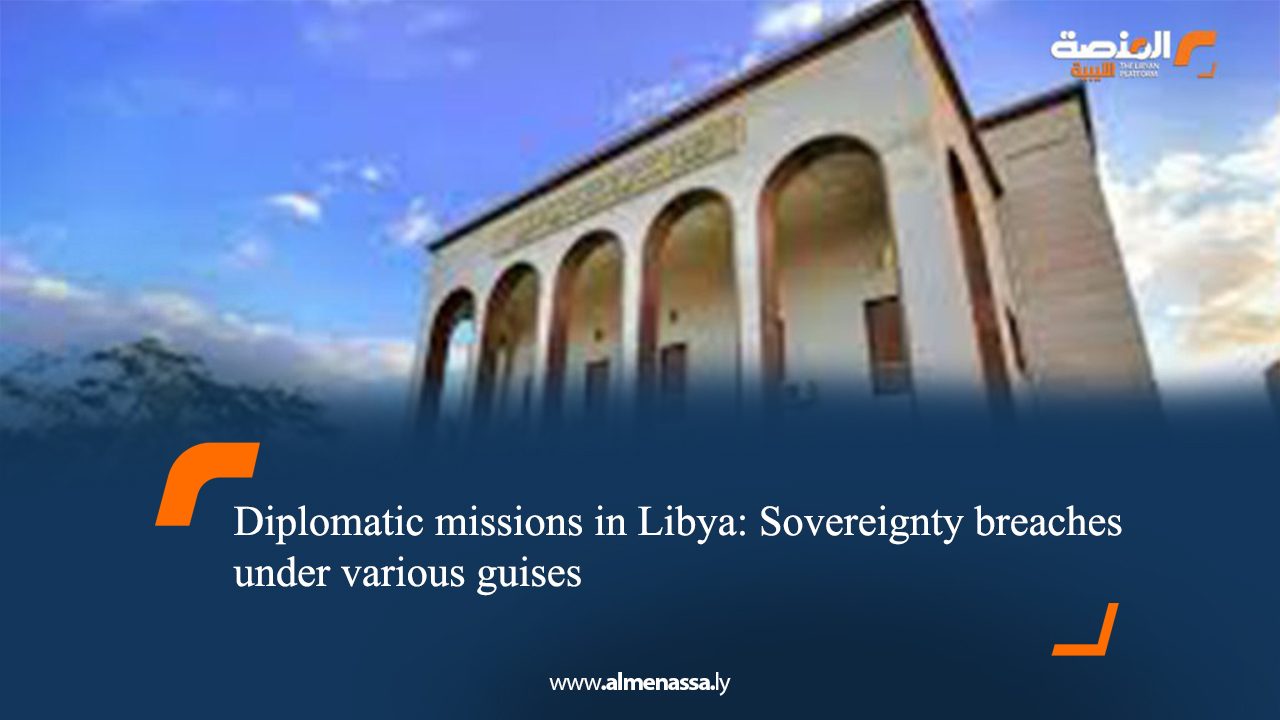The issue of intervention by embassies, diplomatic missions, and the UN mission in Libya’s internal affairs, along with their overreach of local authorities, has been a thorny issue since 2011 and continues to this day. Under various pretexts, such as monitoring the situation or providing assistance, blatant violations of national sovereignty are emerging.
Research centres monitor major powers’ transgressions
This reality is confirmed by specialized research centers. In August 2024, the Libyan Center for Security and Military Studies revealed, following over three years of monitoring, that the movements of foreign ambassadors, especially those from major powers influential within the Security Council and regional and international decision-making, have exceeded their diplomatic roles to reach a level of obvious and sometimes flagrant interference.
The Center stressed that this violation applies to all foreign ambassadors, particularly those representing major powers such as the American, British, French, Russian, Turkish, Italian, and German ambassadors, among others. All of them, according to the Center, have overstepped their authorities and encroached upon political and executive roles, with some even engaging in intelligence activities.
Undermining sovereign institutions
The Libyan Center for Security and Military Studies posed fundamental questions: What business does a foreign ambassador have with the activities, visions, and strategies of a sovereign Libyan institution? What is their connection to the Audit Bureau or transparency mechanisms, or to the operational mechanisms of the Libyan institution whose mandate is solely to hold Libyan officials accountable, not French ones? The Center argued that this situation confirms the overstepping of diplomatic roles and norms, a violation of the “Vienna Convention,” and that the weakness of Libyan institutions and the state in general has allowed all this to occur.
The Center recommended that the Libyan Ministry of Foreign Affairs and International Cooperation review the movements, meetings, and statements of foreign ambassadors that delve into the political, security, and constitutional details in Libya. It also called for these ambassadors to submit periodic reports on the nature of their meetings, the individuals met, and the topics discussed. Furthermore, it advised Libya’s sovereign institutions, particularly the Central Bank of Libya and the National Oil Corporation, to coordinate in advance with the Ministry of Foreign Affairs before holding any meetings with foreign ambassadors.
Osama Njeim’s disappearance: A stark example of violation
Foreign interventions are not limited to holding meetings with officials in sovereign institutions or municipal councils, or tracking data and information deemed confidential and sovereign. The matter has escalated to the disappearance of a Libyan citizen and his handover to the United States. In 2022, Libyans suddenly awoke to news of the disappearance of Osama Njeim, the citizen accused in the Lockerbie bombing, under the pretext of his handover by the Government of National Unity.
In this regard, Njeim’s family announced they had filed a complaint with the Libyan Public Prosecutor’s Office against his abduction and handover to the American side, asserting that Libyan law prohibits the extradition of citizens under any pretext, unless it is conducted according to prescribed legal and judicial procedures.
Accordingly, it can be stated that the interference of some Western embassies in Libyan affairs represents one of the most prominent challenges facing national diplomacy. This situation has been particularly exacerbated by the armed confrontations between Libyan factions over the past years, followed by the recruitment of mercenaries and foreign forces; this has further constrained the performance of Libyan foreign policy.
Libyan Government expresses its rejection
This reality prompted the Head of the Libyan Government, Osama Hammad, to explicitly express his rejection of the transgressions by diplomatic missions in the country. He stated that previous directives had been issued emphasising the necessity of respecting the principle of national sovereignty and not exploiting diplomatic status or UN and international cover to move within Libyan territory, or to hold meetings, activities, and gatherings with citizens and municipal representatives without obtaining the necessary authorisation and approvals.
International and national legislation regulating diplomatic work
Hammad added that everyone must understand that this matter is regulated by international agreements and national legislation. For example, Article 41 of the 1961 Vienna Convention on Diplomatic Relations stipulates that all persons enjoying privileges and immunities must respect the laws of the receiving state.
Hammad continued, stating that Article 27 of Law No. 2 of 2001, concerning the regulation of Libyan political and consular work, mandated that all diplomatic individuals, entities, and international missions communicate through the Ministry of Foreign Affairs. This is also in accordance with the principle of reciprocity applied in international laws and customs, and the local laws of the countries of these envoys or diplomatic representatives.
Call for strict measures
Hammad stressed that the entry, movement, or travel of members of foreign diplomatic missions and representatives of regional, international, and non-governmental organisations are exclusively subject to the provisions of Libyan law and procedures for obtaining explicit approval from the Ministry of Foreign Affairs and legally competent authorities.
In this regard, Hammad urged all relevant security and police agencies to take all deterrent legal measures against any transgressions committed by anyone, regardless of their diplomatic or international status. This is to ensure full compliance with these Libyan procedures and laws across all Libyan territory, and to prevent any entity from engaging in activities outside this framework, which could constitute a breach of the requirements for respecting national sovereignty and the legal controls governing diplomatic and international work in Libya.
The interventions by accredited diplomats in Libya and the UN mission extend beyond merely protecting interests to violating national sovereignty. This necessitates concerted local efforts to preserve national sovereignty and reject the deviation of ambassadors and diplomatic missions from the norms and laws regulating their work.


